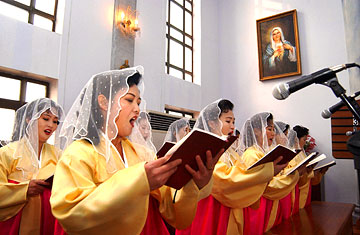
Members of a North Korean church choir sing during a Christmas service held at the Jangchung Cathedral in Pyongyang, North Korea, on Dec. 25, 2007
When North Korean authorities caught Jeong Young Sil helping Christians escape to China seven years ago, they did not take her transgression lightly. First, they pulled out her teeth and fingernails to get information about her underground church in the country's northeast. Then, they threw her in prison for four years. "They demanded to know who was helping me and where they were," says Jeong, an evangelist in her 50s now living in South Korea, who uses an alias to protect her family back home. Despite their efforts, the Northern officials could not stop her. After she fled two years ago, she secretly began sending Christmas gifts to her old church. "Christmas," Jeong says, "would otherwise be meaningless."
For most North Koreans, Christmas has long been a nonevent, in part because the government keeps a tight rein on information about religious holidays from entering the country, and in part because Christians can be arrested for celebrating it. Though the country's constitution does grant freedom of religion to all citizens, North Korean authorities don't seem to pay the idea much heed. The government also monitors other religions — such as Buddhism and Cheondoism, a popular Korean belief system that combines elements of several faiths — but underground churches are particularly feared by authorities because they're estimated to have helped some 20,000 North Koreans defect to China. As a result, the regime routinely imprisons and executes Christian religious leaders who teach their faith without state approval, according to a U.S. State department report. Official figures put the number of practicing Christians at 13,000 in 2001, but South Korean church groups estimate about 100,000 Christians practice in secret churches across the nation now. "We always met for prayer at peoples' homes, in groups of two to keep it private," Jeong says. "When we met in bigger groups, we went far away to the mountains where no one could find us."
Of course, in an impoverished nation where aid organizations provide food aid to some six million people, the Western notion of a gift-giving holiday does not translate very well, particularly after Kim Jong Il's regime effectively stripped most of the nation of any personal savings three weeks ago. Each year underground worshippers in North Korea receive an array of presents from the outside world, including foreign-made clothes and candy, smuggled in by defectors like Jeong.
Meanwhile, the communist regime has placed a slew of nationalistic holidays around Christmas, though their timing is probably a coincidence. On December 24, many North Koreans observe the birthday of Kim Jong Suk — the deceased mother of dictator Kim Jong Il and a revolutionary hero — by making pilgrimages to her birthplace of Hoeryong, a town in the northeast. Three days later, they are given a day off work for Constitution Day. Even New Years' Day is more about revolutionary zeal than ushering in 2010, when thousands of North Koreans will walk in a yearly procession to the Kumsusan Memorial Palace at the northeast outskirts of the capital to pay homage to the preserved body of Kim Il Sung, the father of North Korea.
Life in the North wasn't always so rank-and-file. In the early 1900s, Pyongyang was widely known as the "Jerusalem of the East" for its vibrant milieu of Christians. American Protestant missionaries arrived as early as the 1880s (Catholics arrived centuries earlier but the religion didn't catch on as widely), building religious schools and universities across the capital. Later, as Christianity gained popularity, worshippers held group prayers in public every Christmas. But after the Japanese government took control of Korea in 1910, the new administration began suppressing religious gatherings, and by the 1950s, — after the Korean War left the peninsula split into a communist north and capitalist south, — the northern government began to carry out executions of thousands of Christians for the years to come.
The government took a more nuanced — if short-lived — approach to religion in the following decades. In 1988, South Korea expanded economic ties with its neighbor, bringing in more foreigners on business and exchange trips; the following year Pyongyang hosted the World Festival of Youth and Students, a massive socialist festival that attracted 22,000 people from 177 countries. With an influx of foreigners, the government saw a need to build four state-run churches in Pyongyang in the following years, though critics maintain they're facades to show the world that it supports freedom of religion. "[Foreign missionaries] are allowed to come for relief or other purposes, only if they promise not to spread the word," argues Kim.
Still, some scholars contend the regime practices a kind of pragmatic tolerance of Christianity, suggesting North Korea's intelligence agency chooses to ignore underground churches because of their political usefulness. "How can they not know the whereabouts of 100,000 Christians?" says Philo Kim, a professor of sociology at Seoul National University in South Korea, who has visited North Korea several times to study Christianity there. "The government takes advantage of them by dispatching spies into the churches. They can gather information about the churches in China and how they help defectors escape."
That may be, but it's a limit that most are not willing to test. North Koreans still face execution if they're caught evangelizing, prompting most Christians to put aside Christmas for more patriotic holidays. Because useful or not, says Kim, "Among all religions, Christianity is seen as the most threatening to the regime."
